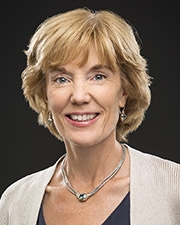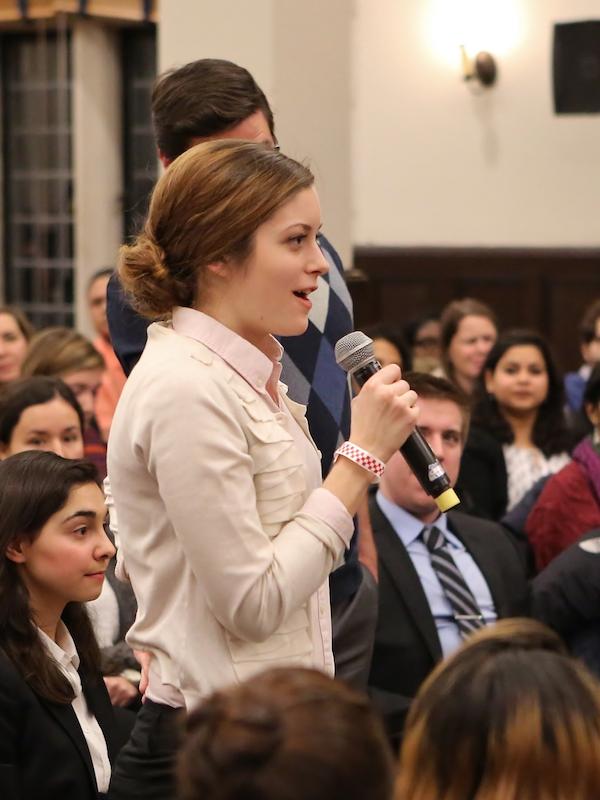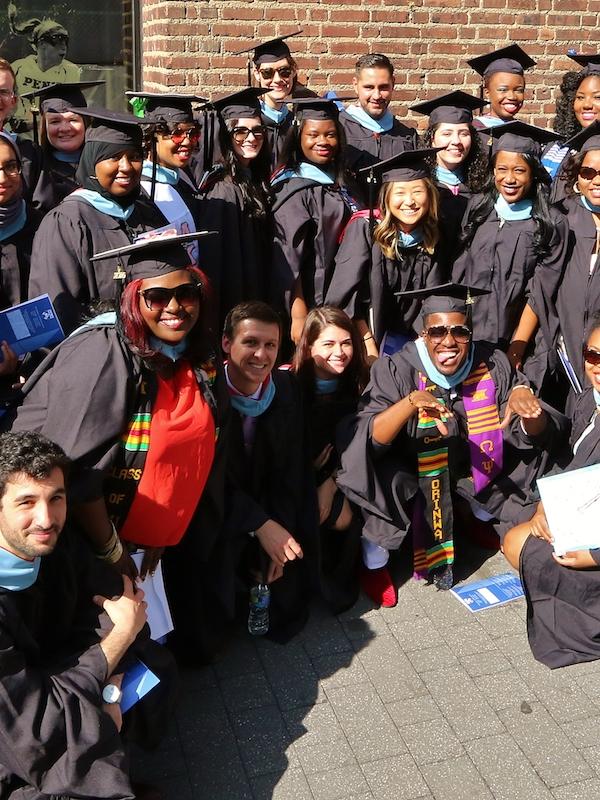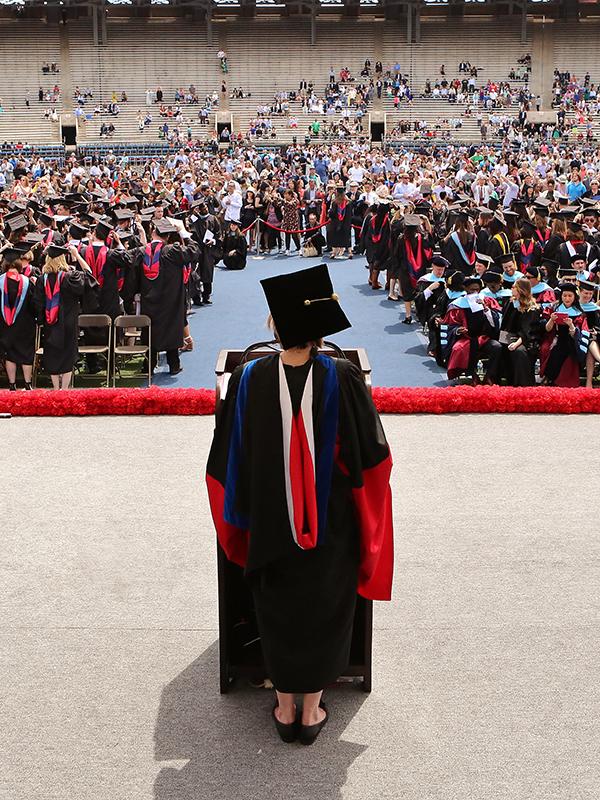Penn GSE Features Higher Education Leaders at Homecoming
Penn GSE highlighted leaders from across higher education at a panel discussion for alumni and friends during Penn’s Homecoming Weekend on November 10. James S. Riepe Professor Laura Perna, chair of the Higher Education division and executive director of Penn AHEAD, led the conversation, entitled “The Future of Higher Education.” The panel featured Penn Provost and Presidential Professor of Law and Education Wendell Pritchett, Community College of Philadelphia President Donald “Guy” Generals, and three GSE alumni: Tarrant County College – South President Peter Jordan, GRD’10, Whittier College President Linda Oubré, GRD’17, and Widener University President Julie E. Wollman, GED’85.
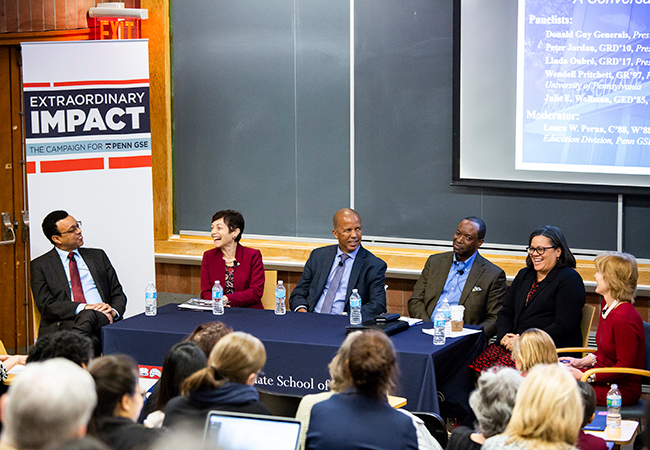
Held in Stiteler Hall, the event began with a welcome by Penn GSE Dean Pam Grossman, who noted that the School’s new spaces in Stiteler are part of a larger planned building expansion as part of the Extraordinary Impact Campaign. Following this introduction, Dr. Perna asked panelists about some of the biggest challenges and opportunities facing their institutions today, including how to meet the needs of diverse student populations.
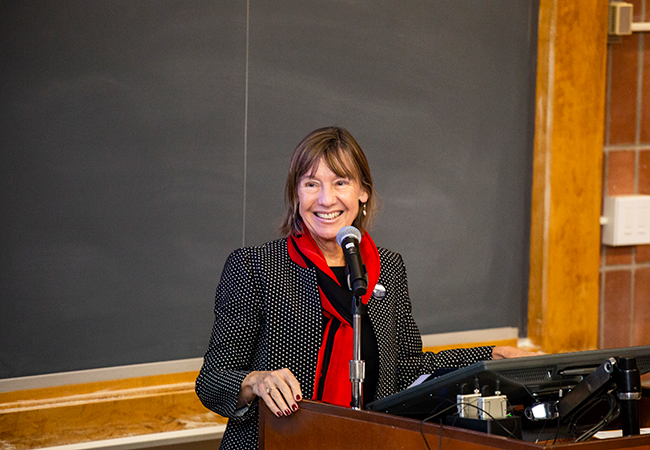
As president of Whittier College, a private liberal arts college in Southern California, Linda Oubré, GRD’17, is committed to creating a culture of change in response to changes in student demographics. “We are a liberal arts college that literally overnight became the only liberal arts college that’s now a Hispanic-serving institution in the United States,” she said. Oubré stepped into her role with a background in both the corporate world and higher education, most recently serving as dean of the College of Business at San Francisco State University. “I myself represent change,” she said. “I don’t think I appreciated how much me walking into the room, and everything I do in my new job, signals change.”
Julie E. Wollman, GED’85, is president of Widener University, which received INSIGHT Into Diversity Magazine’s Higher Education Excellence in Diversity Award for the third consecutive year. Widener, a private university outside of Philadelphia serving 6,500 undergraduate and graduate students, holds a commitment to diversity and inclusion through its Common Ground initiative, a university-wide effort launched by Wollman and designed to advance civil discourse around challenging topics.
“I felt that Widener had the potential to be a leader in creating a comfortable and supportive environment that honors free speech and listening to diverse perspectives,” said Wollman. “The focus of the Common Ground initiative is really listening to people who have different perspectives from you.”
Located in Fort Worth, Texas, Tarrant County College (TCC) is a community college with a mission to “provide affordable and open access to quality teaching and learning.” President of TCC’s South Campus, Peter Jordan, GRD’10, embraces the integrated student success model. This involves leveraging institutional resources to help students succeed.
“Students come to us with different levels of capital, whether it’s cognitive or financial or what have you,” said Jordan. “And we as a college want to make sure that we are aligning our resources in ways that help those students connect with resources that help them build capital, so that by the time they graduate, they’re going into the world much better than when they came to us.”
The panelists also discussed the sustainable financial models of their institutions. Donald “Guy” Generals, president of the Community College of Philadelphia (CCP), emphasized the need for student scholarships and other forms of tuition assistance. CCP is the largest public institution of higher education in Philadelphia, serving more than 685,000 since its founding in 1965.
“I did a study once where I wanted to find out how many students had signed up, registered, and ready to go, and dropped out because they couldn’t pay,” said Generals. “In the course of one year, it was 3,000 students at Community College of Philadelphia, which led to our decision to start our PROMISE program.”
Penn Provost Wendell Pritchett, Presidential Professor in the University’s Law School and the Graduate School of Education, discussed some of the strides Penn is making to enrich experiences for current and future students, including the importance of understanding and promoting a “culture of wellness” across the institution.
“Wellness on campus includes everything from supporting students with mental health concerns to developing a broad array of support options, whether that’s in person, on the phone, or online. The key is to meet students where they are, and encourage them to seek help where and when they need it.”
Pritchett also highlighted meaningful similarities among the panelists, who represent diverse institutions. “In the end, we’re doing the same things, just at different scales.”
Click to watch the video of the full conversation and view photos of the event.

